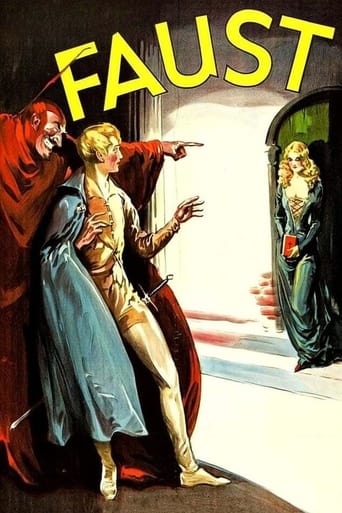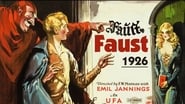Ryan F
I saw Faust last night at a special event at the Paramount theater in Seattle with live organ accompaniment. The hosts relentlessly hyped the movie, so when it started, I had high expectations. I was not disappointed. Faust wastes no time by explaining how portals from Hell opened up and wraiths are running free over the Earth. This is an instant hook, but then it gets better as a head angel makes a bet with the devil Mephisto. So what is there that could go wrong?This movie has world-class production design to complement that it takes place in an apocalyptic, post-biblical fantasy time. Personally, I'm not much a fan of the worlds typical to fantasy stories, but the one in Faust is original and creative.The story follows a young Faust chasing after women and happiness in his new, young body. He finally finds one girl who becomes his only goal. This is fine and tells a perfectly good story. My objection is that the beginning shows us angels, demons, the devil, and the plague. Then the story goes down to deal with small-scale issues, looking at Faust's corruption really close up. This isn't necessarily bad, and the story goes back to its large-scale issues at the end, which has plenty of emotional and physical violence to balance out with Act I. I found it distracting that the jump was made to smaller battles, but these smaller battles are on the emotional side, making them far more important and interesting.Though Faust isn't subtle with its themes, it tells a story that moves right along, despite being seen as "one of those old silent films." The acting can be appreciated without looking down on old styles or thinking them archaic. The movie is dark, but Satan himself is a source of humor in some scenes. I see a lot of people who don't want to watch anything pre-50's and 60's, but right back at the beginning of cinema, there's entertainment, emotion, sex, violence, and comedy present in the same movie. Thank you, Faust.
John W Chance
You will never see cinematography like this in a sound or color film! Murnau's 'Nosferatu' (1925) pales in comparison to this visually fantastic masterpiece!The first half is a perfect supernatural tale of God and the Devil (Mephisto) wagering over the soul of man: if Mephisto can win Faust, all of Earth belongs to Satan. It is shown and told with such amazing photography, sets and acting. Check out the other reviews that describe the wonderment of all its stunning shots in detail. The final scenes are masterful as well: the death of Gretchen's baby and Faust's final salvation.Emil Jannings is so great as Mephisto it looks like the Devil is a sure winner. He steals every scene he's in, whether he's pure evil, puckish, Satanic or clownish. "The Snake Has All The Lines!" No wonder he was the first actor to receive a Best Actor Oscar! It made me want to see his other classic, 'The Last Laugh' (1924).The musical soundtrack perfectly matches the action and mood of every scene. Great!But---the middle really drags on too long as a love story between the now young and handsome Faust and the beautiful Gretchen, and there are some needless scenes of Mephisto being pestered by Marguerite's aunt seeking to be his wife.The movie picks up again in the last third as Gretchen is condemned for her affair with Faust, who sacrifices himself for her, and Mephisto loses the bet.The film is so staggeringly made we can forgive the boring middle parts, but I can only give it a 9, not a 10.
hasosch
F.W. Murnau's "Faust. Eine deutsche Volkssage" (1926) is based on Goethe's "Faust I", the movie takes as direct text basis a libretto written by Hans Kyser which differs remarkably from Goethe's dramatic play. For example, Kyser motivates the physician Dr. Faustus's pact with Mephistopheles through his mercy for the victims of the plague, while in Goethe's work, the basic motivation of Dr. Faustus is the enlargement of his scientific knowledge. It is thus interesting to see that Mephisto or the devil represents the darkness from which all the additional knowledge seems to come which cannot be reached by Dr. Faustus in the world of the light in which God reigns. It is this negativity of the darkness as opposed to the positivity of the light that parallels the dichotomy of Good and Evil as well as the dichotomy of Volition and Cognition. So, Dr. Faustus' fundamental metaphysical attempt is to control the dark empire of the will that cannot be controlled by traditional science settled in the bright empire of the thought. It even seems that negativity stands for reflection, and reflection comes from the darkness that in the same time represents Evil. Moreover, since the Being is defined by the positivity of light, cognition and Good, the negativity of darkness, reflection and will must be defined by the Nothing, since in classical logic there is no third instance between them.Therefore, we may see Murnau's "Faust" not only as a movie dealing with the ethic categories of Good and Evil, but also with the metaphysical categories of Being and Nothing. Dr. Faustus, signing his league with the devil, opens the curtain that separates the Here and the Beyond, he transgresses a border of no return. When Mephisto promises Dr. Faustus that he may enter the contract "only for one day", it is quite clear why Mephisto can always turn around the hour-glass in order to prolong the lasting of the league: Eternity cannot be split; if you take out a piece of Eternity there will remain still Eternity. Since Dr. Faustus is a human being and hence does not participate in Eternity, it follows that he will not be able to stand in this never-land between the contextures of Good and Evil, of Darkness and Light, of Cognition and Volition, of Being and Nothing, of Here and Beyond. His intermediary position is shown by Murnau in the often overlooked scene where Dr. Faustus, who had meanwhile turned by aid of the devil into a young man, is charming a young Indian princess while a pendulum above them is vacillating between light and darkness.Murnau must have had in his mind a poly-contextural world when he shows us Mephisto holding the mirror in which the picture of the old Dr. Faustus appears, although he had already turned him into a youth. Not only does the mirror not reflect Mephisto who is holding it, but it reflects the picture of somebody else and even has a memory of the former state of this person. This phenomenon does not fit together at all with traditional logic in which the mirror can be seen as the operator who turns position into negation, falseness into truth and thus operates like a light-switch that, clicked on twice, leads back to the original state, i.e. from light via darkness back to light or from darkness via light back to darkness.Now, at the end of his life, Dr. Faustus stays in the borderland between light and darkness that cannot be shown at the hand of a light-switch, since this never stops in an intermediary position between light and darkness. Because the light-switch serves as a model for classical logic, we have to deal in Murnau's "Faust" with trans-classical logic and thus with a world in which there are not only the dichotomic contextures Here and Beyond, Being and Nothing, Cognition and Volition, but a never-land as a third instance between them, and thus we read on one of Gerhart Hauptmann's titles the phrase "At the Gates of Darkness", the gates representing this third instance between the dichotomic contextures of classical logic.When we read on another title toward the end of the movie "Death sets all men free", it is clear, that Dr. Faustus, after having entered the border-land between the Here and the Beyond by signing his pact with Mephisto, is on a trip that can only end in the Darkness, the Nothing and thus his Death. Once somebody has crossed the borderline between the contextures, he is on a trip of no-return. But such an end would fit into classical logic and thus not fit together with all the hints Murnau gives us toward polycontexturality. Murnau therefore needs a third instance between the contextures by which Dr. Faustus can be rescued from Death representing Evil in two-valued classical logic, both belonging to the contexture of the Nothing. Since Evil can only be neutralized by Good, this third instance must come from Good in order to finish Dr. Faustus's life not in the darkness of Evil, but in the light of Good, and this instance is his love to Gretchen. But in order to achieve that, Murnau needs another trick that does not fit into classical logic: Since Dr. Faustus has meanwhile turned back into the old man he was at the beginning of the movie, Gretchen must remember the alter ego of Dr. Faustus as a youngster, and Murnau shows this by fading over the pictures of the two alter egos of Dr. Faustus. In other words: Murnau achieves to establish Love as a third instance between the contextures of Good and Evil by doubling Dr. Faustus' individuality using paradoxically the dichotomic means of classical logic. When Dr. Faustus and Gretchens die together at the stake, they have finished their trip in to the light that leads them out of darkness: "Death sets all men free".



